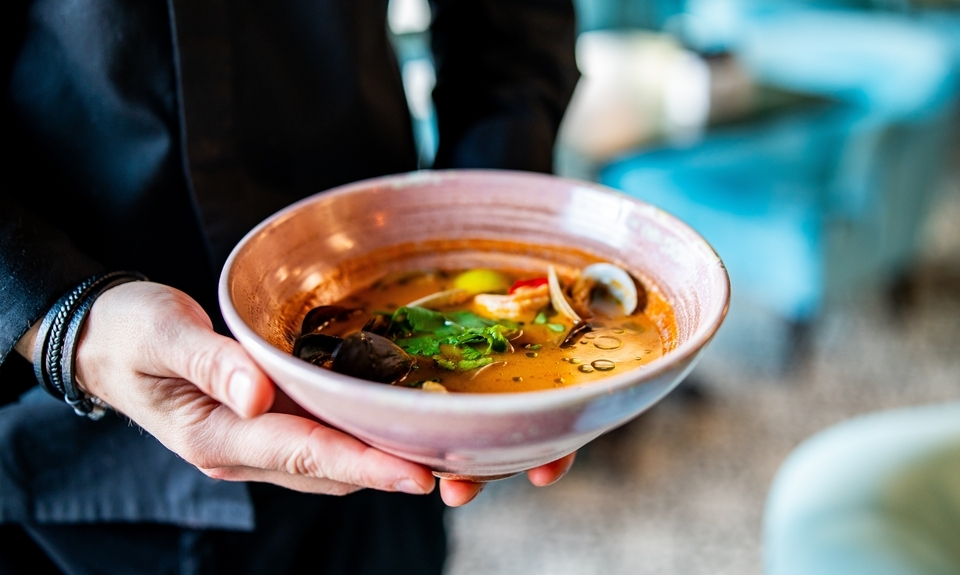Is being honored by the prestigious Michelin Guide really an opportunity for a restaurant? A study of restaurants in Washington D.C. conducted by Saverio Favaron, assistant professor and researcher in Strategy at SKEMA Business School, reveals how high-standing organizations react to a sudden and positive change in their status.
On March 6, 2023, a few minutes after 10 in the morning, the lights of the Palais de la musique et des congrès in Strasbourg go off. A countdown, on a very martial tune, announces the official opening of the ceremony. Over 600 chefs, dressed in their pristine uniforms, fill the amphitheater, eagerly anticipating the announcement of the new Michelin stars. After a brief address by the president of the Alsace departmental council, Gwendal Poullenec, the director of Michelin, steps into the spotlight. He announces that a very special message was delivered. The French President Emmanuel Macron appears on a massive screen. He praises the Michelin Guide as the “bible of our gastronomy” and laudes the chefs for their contributions to the culinary world and society at large, “restaurants, whether large or small, create life”. Despite the lengthy speech and the growing impatience among the audience, the excitement is palpable, as these professionals await the unveiling of the prestigious awards.
The Michelin Guide as a status shock
This momentous occasion underscores the influence and impact that the Michelin Guide holds in the realm of fine dining. The recognition conferred by the Michelin stars can dramatically alter the fortunes of a restaurant, catapulting it to new heights of prestige and success. However, such success can also be accompanied by immense pressure and insecurity as demonstrated by the story of Marco Pierre White and other chefs who made the shocking decision to return his stars and retire from the kitchen, citing the unbearable pressure to maintain the elite status that so many chefs strive for. More recently, plenty of award-winning chefs have shifted focus away from their fine dining flagships—or scrapped them entirely, due to the anxiety associated with the star system and the costs to maintain award-winning establishments. These examples highlights the potential pitfalls that can befall those who achieve high-status positions and the complex dynamics that often surround such recognitions.
Read also: Why do ex-French Sub-Saharan colonies fare better economically than ex-British ones?
Status is a powerful force in the world of business. Companies and individuals work hard to achieve high status, which can lead to increased visibility, access to resources, and performance advantages. However, the unstable and highly visible nature of status hierarchies can also be a source of insecurity for those who find themselves at the top. This insecurity can lead to compensatory actions and attempts to conform to expectations associated with a high-status position. In a recent study we examined how organizations that experience a positive status shock react to their newfound position, shedding light on the complexities of navigating elite status.
In the streets of Washington D.C.
The study focused on the release of the first edition of the Michelin Guide for Washington D.C. in the fall of 2016. . The new Guide aimed to position Washington D.C. as a top gastronomic destination. Prior to the Guide’s publication, the city’s dining scene suffered from a reputation for mostly offering dated steakhouses. With the Guide’s publication on October 13, 2016, Washington D.C. joined New York, San Francisco, and Chicago as the only U.S. cities with a Michelin Guide at the time. The inclusion in the Guide brought a sudden and positive increase in status for the selected restaurants, propelling them into the elite of the industry worldwide. The study is based on the analysis of restaurant menus, and on how they changed before and after the publication of the Michelin Guide. Restaurant menus provide rich and valuable information about restaurants’ self-presentation attributes. They serve as a primary communication tool between the restaurant and its customers, showcasing its culinary offerings, pricing, and unique selling points. Moreover, menus reflect the choices made by restaurant management and chefs, which may be influenced by their perception of their standing within the industry, further highlighting the relevance of using menus as the basis for the analysis.
We compared the 106 restaurants included in the Washington D.C. Michelin Guide with two control groups: (1) restaurants within D.C. that were similar but not included in the Guide, and (2) 106 restaurants in a comparable city (Boston) where Michelin did not enter. The first control group, consisting of 143 restaurants, met the minimum requirements for inclusion in the Guide but were not selected. These restaurants were chosen based on parameters such as local ratings, price point, and cuisine style, and were similar to the treated restaurants. The second control group, located in Boston, was matched to the treated restaurants based on pre-Guide cuisine type, price level, and average Yelp rating. This approach allowed us to more accurately link changes in restaurants’ behavior to the status shock they experienced due to the Michelin Guide’s publication. The study aimed to identify how these high-status actors reacted to the positive status shock and the pressures associated with their new ranking.
Conforming to expectations
We found that newly awarded high-status restaurants reacted to their new position by making three main changes in their menus. First, they altered the descriptive features of their menus to align with the expectations associated with high-status restaurants. We observed a 10% increase in the length of dish descriptions and a reduction of approximately half in the references to portion sizes. Second, they emphasized the authenticity characteristic of elite players, displaying a 20% increase in references to cooking techniques, such as sautéing or sous vide, and highlighting the use of organic, locally-sourced, or small-producer ingredients. Third, restaurants adjusted their pricing strategy, primarily by increasing the entry prices on their menus by around 5%, signaling awareness of the value they created for their customers.
Interestingly, we discovered that the tendency to make these changes was stronger for restaurants that did not receive Michelin stars but were merely included in the guide. This suggests that those not at the top of the ranking felt a greater need to justify their elevated status. Additionally, we examined how a restaurant’s standing (based on evaluations by local critics) prior to the status shock influenced their modifications in self-presentation attributes. Contrary to expectations, restaurants with high prior standing, which should have been less concerned about showing their worth, emphasized attributes related to authenticity and value.
While the study focused on changes in self-presentation, it also suggests that some of these changes may reflect material changes in the restaurants’ operations. For example, modifications to authenticity attributes could potentially indicate actual changes in cooking techniques or ingredient sourcing. However, the data available did not allow the researchers to definitively confirm the extent of operational changes.
Justify your status
The findings of this study illuminate the complexities of navigating high status positions and the potential insecurities these positions can bring about. In the context of the fine-dining industry, these insecurities can lead to changes in self-presentation and, possibly, operational adjustments. Furthermore, our research emphasizes the potential value of examining how status hierarchies and evaluations evolve in other industries and how they impact both organizations and individuals.
Read also: Back to the Paper age: how to increase students’ creativity without a laptop
The concept of status shock can offer valuable insights for managers and organizations aiming to understand the implications of sudden changes in status or recognition. First, it suggests that adapting to sudden status change due to the introduction of new rankings, awards, or changes in consumer preferences. Managers should be prepared to adapt their strategies and operations to address these changes, seizing the opportunities that come with increased status while mitigating potential risks. Second, competing and differentiating in the market is essential, as the study highlights the importance of standing out in a competitive environment, particularly when new benchmarks or rankings are introduced. Managers should focus on differentiating their products or services from competitors to maintain or enhance their position in the market, whether through quality improvements, unique offerings, or effective branding. Finally, leveraging recognition for growth is vital for organizations experiencing a positive status shock. They should capitalize on the increased attention and visibility to drive growth, which could involve expanding their offerings, targeting new customer segments, or investing in marketing efforts to further boost their reputation.
By understanding the implications of status shocks and developing strategies to address them, organizations can better navigate the dynamic and competitive business landscape.
This article was originally published in French on The Conversation. Read the original article.






